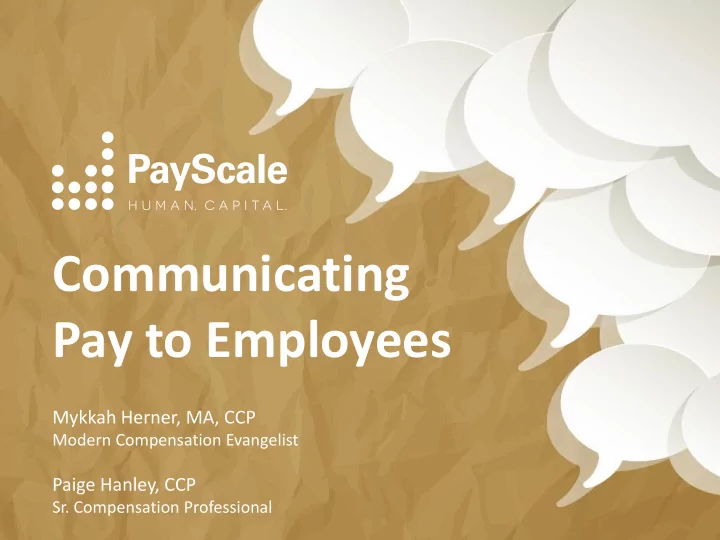

Communicating Pay to Employees Mykkah Herner, MA, CCP Modern Compensation Evangelist Paige Hanley, CCP Sr. Compensation Professional
15,000 Positions 3500 Customers 11 Countries 54Million Salary Profiles 250 Compensable Factors www.payscale.com
Agenda Why communicate? Communication Tips • Train managers to talk about comp • Anticipate employee questions • Get specific. Use data • Additional tips Immediate Actions www.payscale.com www.payscale.com
Perception of pay matters
Workforce Demographics… www.payscale.com
… are changing www.payscale.com
Lead The Conversation 80% of employees will compare pay Source: Card, D., et al., (2011); “Inequality at Work: The Effect of Peer Salaries on Job Satisfaction.”
Train Managers to Talk about Comp
73% of company leaders do not feel confident in their managers’ ability to effectively communicate with employees about salary issues. 2014 PayScale CBPR
Communication Roles HR • Prepare communication, consult and inform Executives, train Managers Executives • Communicate program to organization at a high level Managers • Communicate compensation details to employees Employees • Bring questions to manager or HR
Tips for Effective Employee Communication Know your audience! Watch the compensation jargon Don’t present issues without a way forward Prepare, Prepare, Prepare Be direct and also empathetic Communicate early and often 11
Transparency Spectrum www.payscale.com
Transparency of Comp Plan Employees know… o Only their own salary. o Their range and where it caps out. o All grade assignments for jobs up to a certain level. o All grade assignments for all jobs. o The ranges associated with grade assignments to a certain level. o The ranges for all jobs. o Everyone’s pay. 13
Anticipate Employee Questions
Employee Pay is Low Consider Talking Points Start with appreciation Should the employee pay be low? Mention market movement Is budget available? Explain position in range Provide context Share this year’s increase amount Open the door 15
Employee Pay is High Consider Is this really another job? Does the organization need it? Is the employee qualified? Talking Points Start with appreciation Mention market movement Explain position in range Provide context Share this year’s situation Open the door 16
Performance doesn’t warrant increase Consider Talking Points Start with appreciation How can they get up to par? Mention market movement What future potential is there? Explain position in range Provide context Share this year’s situation Open the door 17
Perception of Increase is Unfavorable Consider Talking Points Reiterate accomplishments Will they perceive their adjustment is fair? Re-focus on individual objectives How connected are they with Remind of market value others? Discuss why their pay is fair Open the door www.payscale.com 18
“I FOUND A SALARY REPORT ON THE INTERNET ” o Conflicting information o An “independent study” o Position pricing vs. people pricing o The conversation 19
Get Specific Use Data 20
Employee Report (1)
Employee Report (2)
Additional Tips for Managers
Consider the Employee Perspective The employee is often going to want: More money Promotion To be paid like their peers To understand why others are paid more than they are 24
Identify Creative Solutions Consider Workplace “Currency” Know what motivates your employees Additional/Alternative Perks FTE preference Staggered increase or offer PTO Work assignments Development opportunities 25
Senior Accountant Accountant II Accountant I Accounting Assistant Grade 7 Grade 5 Grade E Grade C • • • • Basic Function Administrative Update General Ledger Maintain General Interpret financial • & Key Accounting Functions AP / Vendor Relations Ledger reports and statements • • Differentiators to support AP & AR AR Prepare financial for management • reports Analyze financial data • Prepare budgets Degree & None Bachelor’s Degree Bachelor’s Degree Bachelor’s Degree Certification No certification required CPA required at proficiency CPA required at start Requirements • • • • Critical Skills at Attention to Detail Attention to Detail GAAP GAAP • • • • proficiency Excel Quickbooks General Ledger Financial Reporting • • • Data Entry Monthly Reconciliation Financial Analysis • • • Quickbooks Financial Reporting Budgeting • • • • Years of 1-2 at proficiency 3-5 at proficiency 5-7 at proficiency 8-10 at proficiency Experience
Immediate Actions • Connect with your employees about what motivates them • Identify conversations about compensation you need to have with your employees • Develop clear career paths • Prepare any high level messages about comp • Prep toolkits for your managers to use when communicating with employees
PayScale Delivers Where Other Compensation Providers Fall Short PayScale leads the world in compensation knowledge with the freshest and most detailed data from over 40 million salary profiles. More than 3000 organizations use PayScale’s software and intelligence to get the greatest return on their talent. Smart businesses use PayScale Insight to recruit, retain and motivate their people. Visit our blog: www.payscale.com/compensation-today Join our Group on LinkedIn: Compensation Today: HR Best Practices Mykkah Herner, MA, CCP Modern Compensation Evangelist Paige Hanley , CCP Sr. Compensation Professional www.payscale.com
Recommend
More recommend